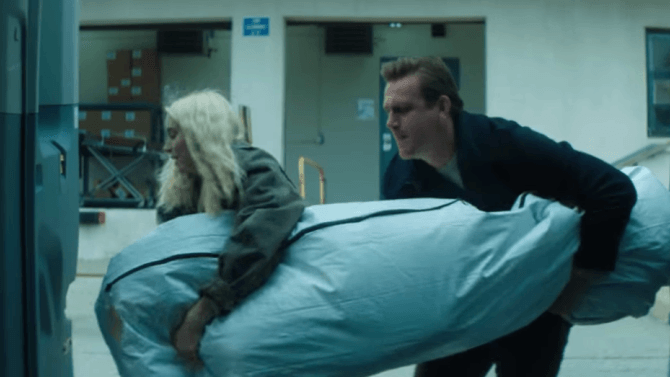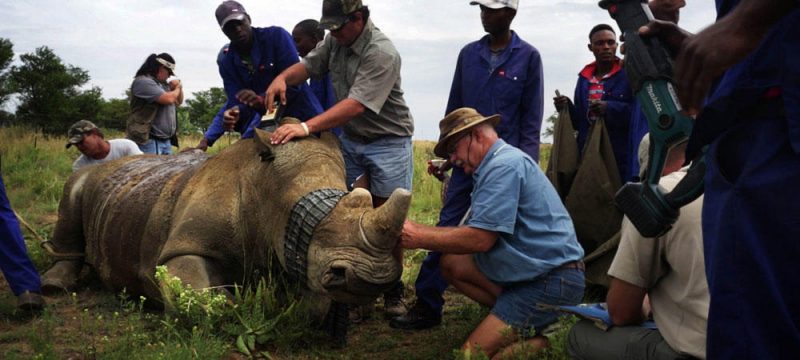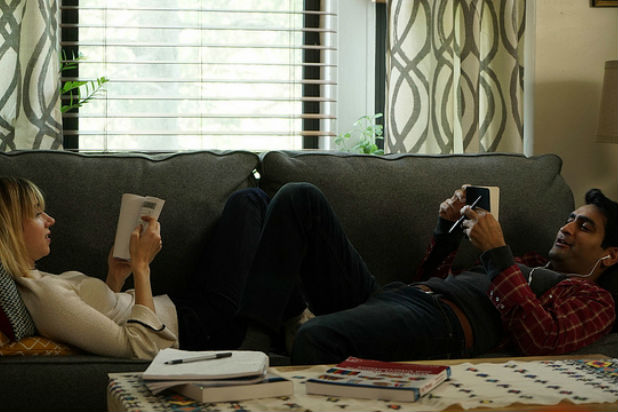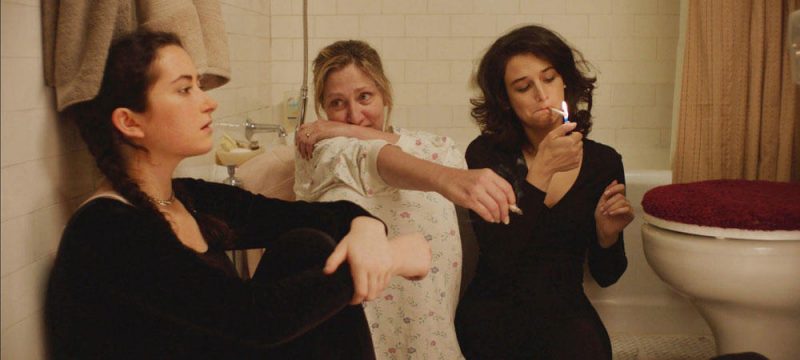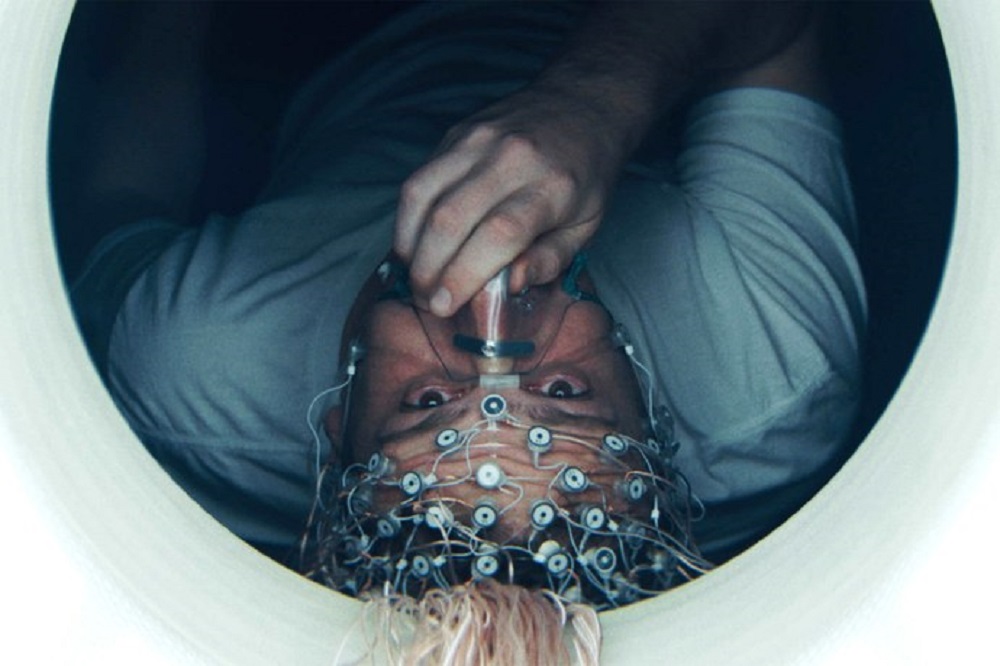
Day 2 at the 2017 Sundance Film Festival felt like the old days checking out Charlie McDowell’s follow-up to the brilliant The One I Love. Rather than follow a formula for The Discovery, McDowell gets darker, more terrifying and abstract. The subject matter of mass suicides is dark, but he manages to take it to depths most filmmakers would be afraid of.
We also got to check out The Big Sick, Trophy and Landline which you can see below along with the Q&A’s after each one.
The Discovery
Just a day after opening the festival with the annual Day One press conference, and giving a very personal introduction of former Vice President Al Gore and his Inconvenient Sequel, Festival founder Robert Redford was back in the spotlight at the Eccles Theater on Friday night. Reporting to work for his original day job, the legendary actor was on hand for the world premiere of The Discovery, in which he plays Dr. Thomas Harber, a renowned physicist who has scientifically unearthed evidence of the afterlife.
Directed by Charlie McDowell and written by McDowell and Justin Lader, the haunting The Discovery posits a future in which millions of people hasten their own deaths in order to “get there” and find another plane of existence. Jason Segel stars as Harber’s estranged son Will, who’s determined to have his father’s discoveries rescinded in order to stem these viral suicides, which emerging love interest Isla, played by Rooney Mara, threatens to join.
During the post-screening Q&A, there were numerous questions about what certain elements of the film might mean or augur, particularly regarding the provocative notion of an afterlife that might improve upon our natural one. But McDowell held true to the idea of leaving things open-ended for a premise that “lends itself to a million more questions.”
“Justin and I were really interested in this idea of what if science and religion came together, and we all have to agree to believe that the afterlife is a real place,” McDowell said, referring to his writing partner Lader. “It’s less about where we specifically believe we go, and more about creating this question, and the hope is that the audience brings the history of themselves into the film. That’s something we did with our first film, The One I Love, and it’s something that really intrigues us. We’re much more interested in the audience bringing the makeup of who they are into the film, and us not preaching or saying that this is exactly what we believe, or specifically where we go.”
Redford followed by praising McDowell’s daring as a storyteller, which echoed with things he’s often said about the importance of Sundance as a platform for free expression, and hinted at why this collaboration came to pass. “He has a vision. I mean, this work was really out there,” Redford said. “Charlie is a director that takes risks, and then stands by them. And he’s fierce in his stance. I think he’s going to have a wonderful career.”
If only in jest, McDowell wasn’t about to chance a different evaluation than that one.
“I’d like to announce my retirement now. This is it. I’m done,” McDowell said. To which Lader provided the kicker.
“That’s what it’s like when the afterlife is perfect,” he said.
Trophy
Should economics determine the fate of endangered species?
Director Shaul Schwarz, who returns to the Festival after his 2013 documentary Narco Cultura, and screenwriter Christina Clusiau explore the industry of big-game hunting in Trophy.
“We started this film by me sitting in the kitchen and going online and stumbling on a picture of a guy posing next to [a dead] elephant,” Schwarz explained. “I wanted to kill him – I thought he was the most disgusting individual.” Schwarz, who is from Israel, had never been exposed to trophy hunting and was horrified at what he found.
As he and Clusiau began digging deeper, however, they soon realized it wasn’t that simple. “We very quickly understood that we don’t know that much and it is a much more complex issue than we thought it was.”
The pair went to meet South African rhino farmer John Hume, an ostensibly greedy businessman who trimmed his rhinos’ horns to sell the ivory. Instead, Schwarz and Clusiau found a man who proclaimed he had the solution to saving the rhinos, and argued that he wanted to see them alive rather than be killed by poachers. To his point, when ivory trade was declared illegal, Hume struggled to take care of his rhinos, and the poaching skyrocketed.
The rightness of the “if it pays, it stays” mentality is interrogated throughout the film. If a laissez-faire, self-interest-based approach at least achieves the goal of keeping these animals alive, should it be considered?
The Big Sick
Michael Showalter’s dazzling The Big Sick is many things. It’s a culture clash tale, a story about how we often end up dating our partner’s parents, but it’s mostly a smart, superb and consistently surprising comedy romance that played like gangbusters at its premiere Friday at the Eccles Theatre.
Silicon Valley star Kumail Nanjiani and wife writer-producer Emily V. Gordon co-wrote the screenplay based on their own real-life romance. Nanjiani is a Chicago-based, mildly successful stand-up comic who is at odds with his tradition-based Pakistani family. He’s forever dodging his domineering mother’s endless introductions to potential brides for an arranged marriage. At a comedy club, he meets spunky blond American Emily (a terrific Zoe Kazan), and the two begin a passionate romance before the difference in their cultures drive a wedge in their relationship. When Emily falls mysteriously ill and lands in the hospital, Nanjiani is forced to impulsively sign off on placing her in a medically induced coma. He soon finds himself becoming close to Emily’s parents (Holly Hunter and Ray Romano) and realizes that he needs to find a way to love Emily and overcome the estrangement from his own family.
The challenging material is a change of pace for Showalter, noted for writing comedies such as Wet Hot American Summer. But as last year’s Hello, My Name Is Doris proved, he’s evolving into an accomplished filmmaker. Showalter deftly balances the more dramatic elements of the screenplay with rapid-fire humor and is ably assisted by his talented cast. Nanjiani emerges as a charismatic leading man who capably plays every facet of his filmic self.
As she often does, Hunter steals every scene she’s in. During the Q&A that followed the screening, former sitcom star Romano explained that he was at first intimidated to appear opposite the Oscar-winner. “When you work with Holly, you have to bring out the truth in each scene,” he admitted. “I figured she’d be an intense actor and would scare me. She was intense, but she was also the warmest intense person I’ve ever met.”
Nanjiani and Gordon worked on the screenplay for more than three years before they felt they got it just right. “People deal with very difficult uncomfortable situations, and in this movie these are people who are trying to maintain a sense of humor through something that is excruciatingly painful,” he told the audience. “That’s something we kept coming back to. You try to explore that side of it. It’s the only way to survive.”
Landline
In Gillian Robespierre’s energetic, observant Landline, sisters Dana and Ali (Jenny Slate and newcomer Abby Quinn) navigate 1995 Manhattan with its CD-listening stations, eyebrow rings, rave parties, Lorena Bobbitt headlines and, yes, landline phones, until two affairs threaten their relationship. Dana cheats on her fiancé (Jay Duplass) with an edgier man she knew from college (Finn Wittrock). Meanwhile, Ali has discovered, thanks to a mysterious floppy disk, that her unsuccessful playwright father (John Turturro) has also been stepping out and decides whether to expose his affair to their mother (Edie Falco), a sharp businesswoman with a yen for Hillary Clinton’s power suits.
Introducing Robespierre before her comedy premiered in the U.S. Dramatic Competition Friday, Sundance Film Festival director John Cooper told the audience at the Eccles Theatre that his team was pleased to have her back three years after her Obvious Child (also with Slate) was a breakout hit at the 2014 Festival. “One of the proudest moments for all of us at Sundance is when filmmakers return to us with works that transcend even the great things they did before,” Cooper said. “Gillian is one of those directors who continues to surprise us.”
The director revealed that the idea for Landline grew out of conversations she, Slate, and co-producer/screenwriter Elisabeth Holm had on the road promoting their award-winning 2014 film. “We started talking about our families and how we all grew up in New York City in the ’90s and our parents are divorced,” she explained. “We had a similar experience in that divorce was kind of cool for us in a way and brought our families together. We wanted to make a movie about a family that wasn’t torn apart by divorce.”
As for any hidden significance in the title, Robespierre remarked that it was a way to set the tone of the ’90s before anyone began watching the film. “We all had one for many years and we were tied to it,” she said. “We didn’t have tiny computers in our pockets at all times.”
Robespierre also shared that even with the decision to set the film in the mid-’90s, she and Holm never intended to create a nostalgia piece but rather something more subtle. “When we started writing the movie, we didn’t want to have to rely on Facebook and Instagram as a story device,” she added. “Stalking your loved one is easy to do now.”


